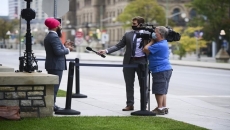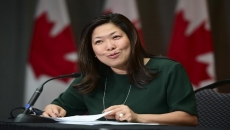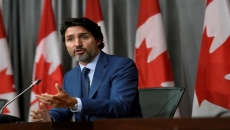Crown corporations have handed out an estimated $422 billion in loans, guarantees and deferrals to businesses since the start of the pandemic, the parliamentary budget officer says in a report that warns about a lack of details around the measures.
Four Crown corporations account for roughly $236 billion of the liquidity measures, as they're known, doled out since the start of the pandemic to make it easier for businesses to manage costs.
The measures are mostly to be repaid, with just some portions of loans being forgivable, meaning they are unlikely to have a large effect the federal deficit.
But budget officer Yves Giroux's report warned that they represent a significant expansion of the government's financial footprint and exposure to risk from bad debts that would hit Ottawa's bottom line.
"That's potentially a risk for Canadian taxpayers, who are ultimately on the hook if things turned sour. For example, if there was to be widespread default on these loans," Giroux said.
Even more problematic, he said, is the lack of public reporting of potential budget costs and risks.
Three of the Crown corporations reviewed provided the PBO with analyses of how a sharp downturn would impact their finances, but asked that they not be released publicly.
The fact the internal documents aren't being released to parliamentarians is a concern in terms of transparency for the budget office, Giroux said, particularly as the risks to the public purse may be worsened because of the unprecedented shock from the pandemic.
The one outlier in the report is the Bank of Canada, which reports weekly on its asset purchases, making it a model for other Crown agencies to follow, Giroux said.
The central bank has added $186 billion to its balance sheet since March to help ease funding for provinces, cities and private companies, and $234 billion in federal debt to effectively provide low-cost loans to the government.
As Giroux's report notes, the programs not overseen by the central bank have had mixed success. Some are under-subscribed, potentially exposing flaws like in the now-expired commercial rent-relief program, or been a big draw like an emergency loan program for small businesses.
The loan program, known as the Canada Emergency Business Account, hands out up to $40,000 in interest-free loans, with one-quarter of the funds eligible to be forgiven if paid back by the end of next year.
Loans through the program have helped many small companies manage costs, but the Liberals have yet to follow through on a promise from May to expand eligibility. Last week's throne speech also included a pledge to help businesses with fixed costs, such as rent.
Finance Minister Chrystia Freeland told the House of Commons the government would have more to say "very soon" on updates to the loan program and throne speech promises, such as targeted support for businesses facing new rounds of lockdowns.
Dan Kelly, president of the Canadian Federation of Independent Business, said the updates can't come soon enough.
He said the original $40,000 lifelines are running out and suggested the government expand the loan value and amounts forgivable to keep businesses afloat the longer the crisis goes on, or if it deepens.
"So many of our members right now are struggling to outrun their debt," said Kelly, whose organization represents thousands of small businesses.
"If we move into another round of shutdowns, you can imagine how much more significant the problems are going to be."
For a government that is facing a historic debt and deficit, adding more in loans, loan guarantees and deferrals may be enticing because it won't show up on the bottom line. Giroux didn't put a specific figure to it in his report, but said the impact has been minor in the past.
Robert Asselin, senior vice-president of policy at the Business Council of Canada, said beyond liquidity supports, governments need to restore consumer confidence.
"And then companies can restore revenues and their bottom lines. So that's the real problem for the sectors who have been really affected," said Asselin, a former adviser to the Trudeau government.
"Liquidity was necessary, and it still is in some cases, but really the overall issue is demand."






